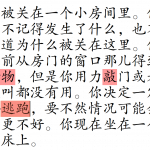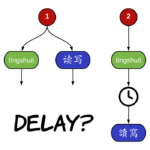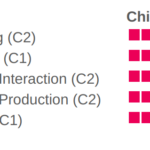Articles in the ‘Reading’ category Page 6
-
20 tips and tricks to improve your Chinese writing ability
Writing is one of the four basic language skills, and one that learners of Chinese struggle with a lot. Good writing is based on lots of reading, but beyond that, there are plenty of other things you can do to improve your writing ability in Chinese beyond the characters themselves. Here are twenty tips and tricks!
Read → -
Are simplified characters really simpler to learn?
Are simplified characters easier to learn? They have fewer strokes, but quicker to write doesn’t necessarily mean easier to learn! The simplified vs. traditional characters debate has been going on for a long time, mostly based on emotion. In this guest article, Ash Henson from Outlier Linguistics strives to add reason to the mix and answer the question of whether simplified characters are actually simpler to learn.
Read → -
An introduction to extensive reading for Chinese learners
Too many students of Chinese spend most of their time reading a small number of difficult texts, whereas they would actually be much better off reading a larger number of easier content. Are you focusing on extensive reading enough?
Read → -
Training your Chinese teacher, part 4: Writing ability
Writing ability is largely determined by how much you read, but there are many areas where a teacher can help you through valuable feedback. This article looks at this process, discussing what activities to engage in and what role your teacher can play.
Read → -
Should you learn to speak Chinese before you learn Chinese characters?
The question of whether or not to delay learning Chinese characters in favour of the spoken language is an interesting one many arguments in favour of both approaches. For most people setting out on their Chinese learning journey, focusing on important aspects of the spoken language, such as pronunciation, is certainly more important than learning characters.
Read → -
Learning Chinese words: When quantity beats quality
Any teacher, student or researcher will agree that vocabulary is important, but how should you go about it? What’s the goal? This article argues that a common problem for learners of Chinese is that they spend too much time learning too few words, and that they would be better of aiming for quantity over quality in many cases.
Read → -
When spaced repetition fails, and what to do about it
Spaced repetition software can boost your vocabulary learning significantly. The idea is to schedule each review as late as possible, but not so late that you forget the answer. This sounds good in principle, but when it comes to learning languages, just barely being able to come up with the right word is not enough!
Read → -
Text adventure games and how to use them in the Chinese language classroom
Interactive text games work well for individual learners, but they are also excellent in a classroom setting. This article gives you everything you need as a teacher to play Escape! in your classroom. A Chinese version of this article is available as well.
Read → -
How to figure out how good your Chinese is
Figuring out how good your Chinese is can help you focus on the right areas and evaluate your learning methods. But language assessment is hard! This article describes how and why you should assess how good your Chinese is, and gives you tools and resources to do so.
Read → -
5 levels of understanding Chinese characters: Superficial forms to deep structure
How much do you need to care about the actual composition and meaning of a Chinese character when learning it? In general, better understanding means it’s easier to learn, but is there a limit to how closely you should stick to actual etymology? This article explores the spectrum from using superficial images to real etymology from the perspective of a language learner.
Read →









